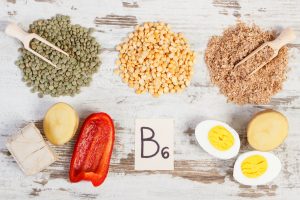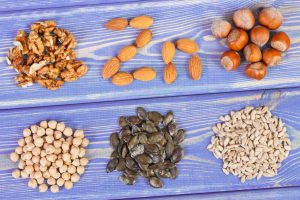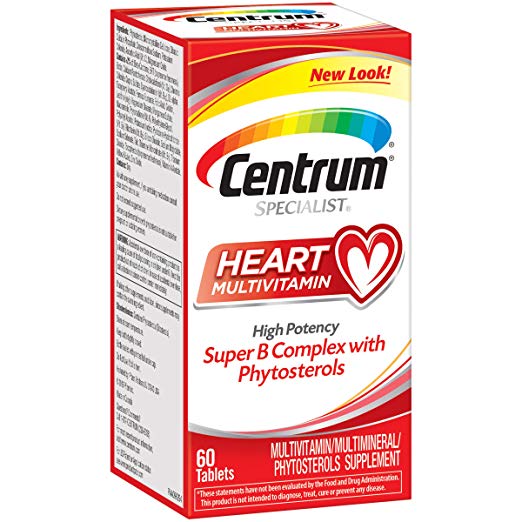The Centrum Specialist Heart Complete Multivitamin is all about heart health. It comes highly recommended with 100% recommended daily value of 14 essential nutrients. It supports a healthy heart and circulatory system by lowering cholesterol and helping your body maintain healthy blood pressure.
Here are some of the heart-healthy ingredients you will find in the Centrum Specialist Heart Complete Multivitamin:
Phytosterols
Naturally-occurring and found in plant cells, these compounds are surprisingly similar to cholesterol in the human body. In fact, they will compete with cholesterol for absorption in the digestive system. That is why it can help you lower your cholesterol. It lowers LDL cholesterol up to 14% and total cholesterol up to 10%. It is found in food (like nuts, legumes, oils, and whole grains) but most people do not get enough from diet alone. That is why it can be a good idea to take it as a supplement! [1]

B-Vitamins
This multivitamin is rich with B-Vitamins! One of these is folic acid, the man-made form of folate or vitamin B9. It is an essential nutrient (which means our bodies don’t produce it naturally). Folate performs many functions:
- It helps produce and maintain new cells
- Prevents changes to DNA (which could lead to cancer)
- Lowers homocysteine levels (these are amino acids in your blood; high levels are linked to increased risk of heart disease)
- Helps prevent birth defects
- Can help prevent certain cancers associated with low folate levels
The body converts the folic acid to vitamin B9. This is sometimes a slow process, but taking other B vitamins facilitates that process. [2] [3] [4]
Other B-Vitamins include:
Vitamin B12. This vitamin keeps the body’s nerve and blood cells healthy. It also helps your body make DNA. Like folate, it reduces homocysteine levels. It can also help prevent some types of anemia. [5]
Thiamine. Thiamine deficiency is linked with metabolic disorders and some brain disorders. People take thiamine to counteract thiamine deficiency as well as treat cataracts, kidney disease (caused by diabetes), and painful menstruation. One study also reports that thiamine deficiency is prevalent in people with congestive heart failure (CHF), and taking thiamine supplements helped prevent CHF. [6] [7]
Biotin. This vitamin is important in breaking down fats and carbohydrates. It’s often taken for hair loss, brittle nails, diabetes, diabetic nerve pain, muscle cramps, and certain inherited muscle diseases. [8]
Riboflavin. This also breaks down fats, carbohydrates, and proteins to produce energy. It is important to the development and function of the digestive tract, blood cells, and vital organs. This vitamin can also help prevent cataracts and helps convert folate into a form the body can use. One study shows riboflavin reduces homocysteine levels by 26 – 40%. Your digestive system flushes riboflavin through your body every day, so you need to consume it every day, too. What easier way to do that than a simple daily supplement? [9]
Vitamin B6. This vitamin is involved in over 100 enzyme reactions. It is also important in the metabolism of proteins, carbohydrates, and lipids. And it helps maintain homocysteine levels. (Pattern detected: B vitamins are good for you homocysteine levels). It reduces nausea and vomiting in pregnant women and can reduce symptoms of PMS. [10]

Antioxidants
This multivitamin contains vitamins C and E, both of which are great antioxidants full of benefits. Antioxidants are important for protecting the molecules in your body from other harmful molecules like free radicals. Apart from this, benefits from these vitamins are as follows:
Vitamin C must be part of your diet. It is necessary for the production of collagen, important for protein metabolism, a component of connective tissue, and key in healing wounds. One of its superpowers is reducing “bad” or LDL cholesterol. Another heart healthy benefit is that it lowers blood pressure. It also improves iron absorption in your body. It’s great for your immune system, helping with the production and health of white blood cells. There isn’t much reason not to take a vitamin that includes your daily vitamin C. [11]
Vitamin E is also a great antioxidant. It is taken to prevent heart disease and keep the arteries from hardening. It helps reduce chest pain and leg pain from blocked arteries. It can also help prevent brain degeneration (that’s again thanks to the antioxidant factor). And it helps prevent pregnancy complications due to high blood pressure. It’s an essential for anyone, but especially if you are worried about your heart or brain health. [12]

Essential Minerals
Zinc is another nutrient in this multivitamin. Deficiency is rare in the U.S. but associated with slowed growth, loss of appetite, hair loss, diarrhea and nausea. But what about heart health? Researchers from the University of Leicester have monitored the way zinc manages how calcium moves through your heart cells – this is important because excessive calcium can lead to heart failure. [13] [14]
Manganese is an essential mineral you must include in your diet. It is involved in chemical processes that break down cholesterol, carbohydrates, and proteins. It’s possibly part of bone formation, which is why people take it for osteoarthritis and weak bones. [15]
*Do not take more than 11 mg of manganese per day.
With a 4.6 out of 5-star rating on Amazon, this is a great supplement to add to your shelf. These vitamins benefit everyone, but are especially great for those with high homocysteine levels, blood pressure, or cholesterol. Reviewers have reported how they have seen their cholesterol drop, their blood pressure lower, and their energy return. Try Centrum Specialist Heart Complete Multivitamin to see if it is right for you and your heart!
Always consult your doctor before starting a new multivitamin, especially if you have any serious health problems, are taking other medications, or are pregnant or breastfeeding.
Resources:
- https://my.clevelandclinic.org/health/articles/17368-phytosterols-sterols–stanols
- https://www.drugs.com/folic_acid.html
- https://www.healthline.com/nutrition/folic-acid
- https://www.healthline.com/nutrition/folic-acid-vs-folate#section1
- https://ods.od.nih.gov/factsheets/VitaminB12-Consumer/
- https://www.webmd.com/vitamins/ai/ingredientmono-965/thiamine-vitamin-b1
- https://www.healthline.com/nutrition/thiamine-deficiency-symptoms#section4
- https://www.webmd.com/vitamins/ai/ingredientmono-313/biotin
- https://www.livescience.com/51966-vitamin-b2-riboflavin.html
- https://ods.od.nih.gov/factsheets/VitaminB6-HealthProfessional/
- https://www.healthline.com/nutrition/vitamin-c-benefits
- https://www.webmd.com/vitamins/ai/ingredientmono-954/vitamin-e
- https://www.webmd.com/vitamins/ai/ingredientmono-982/zinc
- https://www.organicconsumers.org/news/zinc-benefits-play-important-role-heart-health
- https://www.webmd.com/vitamins/ai/ingredientmono-182/manganese

